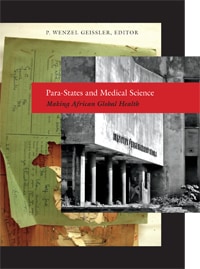21st century politics are marked by a focus on ‘life’ (cf. Fassin 2007). Governments, international organisations, and private companies, for instance, are showing their concern about survival through humanitarian interventions in the event of an emergency (or more precisely, situations deemed as emergencies). Other political priorities concern the development, purchase, and implementation of technologies of survival, and the optimization of physical well-being among the middle classes all over the world. The authors of the collection on Para-States and Medical Science take up this new political concern about ‘life’ in their studies on medical research and public health intervention. They engage with relate to literature which shows how Africa has been a laboratory used by colonial powers and imperialists to launch medical as well as social experiments (Tilley 2011, Rottenburg 2009). These politics of experimentation have been prominently captured in literature in the form of reflections on ‘government by exception’. This is a form of government operating in the modus of the emergency case and often describes interventions or medical experiments undertaken by pharmaceutical companies or international political or private organizations which enable individuals for the duration of the intervention better access to health care. In turn these interventions subordinate participants’ bodies and minds to medical regimen determining over life and death. (Nguyen; compare also Nguyen 2009)
 Reflecting this literature and its paradigm of bio-governmentality, the collection at hand explores the social and political forms revolving around these experiments in the form of research institutions or networks sponsored by foreign donors but conducted by ‘local’ experts (Geissler, Gerrets, Lachenal); the social life of trial and research centers (Meiert, Polykett, Whyte); and of companies in charge of health interventions (Beisel).
Reflecting this literature and its paradigm of bio-governmentality, the collection at hand explores the social and political forms revolving around these experiments in the form of research institutions or networks sponsored by foreign donors but conducted by ‘local’ experts (Geissler, Gerrets, Lachenal); the social life of trial and research centers (Meiert, Polykett, Whyte); and of companies in charge of health interventions (Beisel).
Headed by a conceptually rich and well-argued introduction, the collection contains eleven strong contributions, all of which present original empirical case studies on diverse topics of public health intervention and research in African countries, ranging from history to social anthropology.
The authors discuss the interdependence between medical research and health interventions, with regard to HIV/AIDS (Nguyen; Lachenal; Fassin), malaria (Gerrets; Beisel; Kelly), and leprosy (Manton). The overarching theme is ‘para-states’, through which medical research and health interventions are pursued in Africa. Here, the studies analyse the “creative relations between new (bio)political forms and the state” (Geissler, p. 9).
Many chapters show that the nation state, its projections of the future and collectivity, and its aspirations towards ‘the good life’, continue to be vital to the para-statal enterprises and their social lives. This is best demonstrated in a study by Rene Gerrets on CONTACT, a transnational malaria research trial to study the efficacy of therapies based on atestunate – an expensive but effective malaria drug – ‘under real world conditions’. Some of the organisations were private and international companies while others were hybrid collaborations between public and private entrepreneurs. Studying the complex relations of these organisations and researchers, Gerrets discusses the shifting collaborations and arrangements existing between these various actors in order to ensure a steady supply of atestunate. He describes the fine-grained diplomacy and negotiations of scientists and representatives of various Tanzanian organisations and an American one, each of them having different levels of local and international political influence, trying to balance the local conditions, the need for cheap drugs for potential patients, and the political sentiments of all participants in the project. These were eventually ruled out by government politics when the supply of drugs dropped during election times and the distribution almost came to a halt. Gerrets points out the consistent power of the government to make or unmake a medical experiment.
Despite the growing importance of international organisations operating transnationally and their modes of transnational governmentality, the nation state remains an important factor and actor for public health intervention in the context of neoliberal science.
In addition, the material conditionality of government politics remains important for creating social forms of inclusion and exclusion, which can impact on people’s access to treatment (Reynold Whyte).
However, Geissler claims that new social forms and collectivities mark a dramatic change in the context of reterritorialised bioscience. These are no longer formulated with regard to national citizenship but rather are “turned into an assemblage of individual bearers of bodies and ailments, rights and claims” (p. 17). Take, for instance, the volunteers of an HIV trial in Uganda, who have, over time, formed a network that intersects with other networks based on kinship or neighborhood (p.276p.). These networks of volunteers are drawn together by material benefits and medical treatment as well as by reformed bodily and relational ethics (Meinert). Opening ethnographic and analytic perspectives on these new collective forms and their materiality is a truly innovative contribution of Geissler and other authors in the collection to the re-thinking of the implications of transnational forms of governmentality and global economies of science, technology, and knowledge on social life in the 21st century.
This collection offers a fresh interpretation of the paradigm of bio-governmentality, the discussion on the nation state in neo-liberal condition, and the project of development in the context of globalisation of African societies.
It is an important conceptual contribution to the study of politics and social life in the 21st century and will be a valuable read not only for scholars interested in the study of science, technology, and the anthropology of health, but also for those interested in political science and development in Africa.
References
Fassin, Dedier (2007). “Humanitarianism as a Politics of Life.” Public Culture 19, 3: 499-520.
Nguyen, V.-K. (2009). “Government-by-exception: Enrolment and experimentality in mass HIV treatment programmes in Africa.” Social Theory & Health 7(3): 196-217.
Rottenburg, Richard (2009). “Social and public experiments and new figurations of science and politics in postcolonial Africa.” Postcolonial Studies 12(4): 423 – 440.
Tilley, Helen (2011). Africa as a Living Laboratory: Empire, Development, and the Problem of Scientific Knowledge, 1870-1950, University of Chicago Press.
Geissler, Paul Wenzel (ed.). 2015. Para-States and Medical Science: Making African Global Health. Durham: Duke University Press. 376 pp. Pb $27.95. ISBN: 978-0-8223-5749-0.
****************
Featured image (cropped) by Tim Reckmann (flickr, CC BY-NC-SA 2.0)



